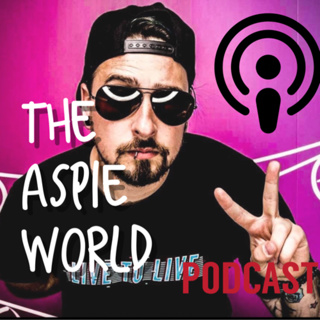
Emotional Regulation in Girls with Autism
Welcome to Thwe Aspie World, where we delve into important conversations surrounding neurodiversity. In this episode, join our host Dan, who bravely shares his personal experiences as someone with Autism, ADHD, and OCD. Today, the spotlight is on a crucial topic - Emotional Regulation in Girls with Autism. Dan provides unique insights into the challenges and triumphs faced by girls on the autism spectrum, shedding light on the intersection of neurodiversity and emotional well-being. With a genuine and candid approach, he explores the nuances of emotional regulation, offering valuable perspectives that can benefit individuals, families, and communities. Whether you're navigating the complexities of neurodivergent experiences or seeking a deeper understanding of the diverse spectrum of human emotions, this episode promises to be an enlightening and compassionate exploration. Tune in as Dan opens up a dialogue that fosters empathy, understanding, and awareness surrounding the often-overlooked aspects of neurodiversity.
22 Nov 202319s

10 Lesser Known Physical Signs of Autism In Girls
"Unveiling Autism: Beyond the Obvious" is a podcast that delves into the lesser-known aspects of autism spectrum disorder, specifically focusing on the often overlooked signs in girls. In this episode, we unravel 10 subtle yet significant physical signs that could indicate autism in girls. Join us as we navigate through these nuanced markers, shedding light on a vital yet underexplored dimension of autism spectrum disorder. Whether you're a parent, educator, or simply curious about understanding autism more deeply, this episode offers valuable insights that could reshape your understanding of autism in girls.
22 Nov 20233min

Do You Have Autism And OCD? (MUST SEE)
In this video, Dan, who has Autism, ADHD, and OCD, discusses the connection between Autism and OCD and how they differ. He emphasizes the importance of addressing OCD as a separate condition and offers a personal perspective on both disorders. He mentions that OCD can be damaging to mental health and highlights the value of therapy, recommending the BetterHelp app. Dan differentiates between typical OCD and OCD within the context of Autism, noting that for some on the Autism spectrum, repetitive actions can be comforting and enjoyable. He also mentions the importance of routines for individuals with Autism. Dan acknowledges the co-occurrence of OCD and Autism, inviting viewers to share their thoughts in the comments.
21 Nov 20233min

Girls with Autism - How To Manage Executive Functioning
Girls with Autism 🌈. Often overlooked, their unique experiences and challenges deserve recognition and support. 🤝 BETTER HELP: https://link.heropost.io/BH 🧠 Executive Functioning is a crucial aspect of daily life, and for those on the autism spectrum, it can sometimes feel like navigating a complex labyrinth. But you know what? 🤷♀️ We've got this! 💪 Here are some tips on how to manage Executive Functioning like the fabulous warriors we are: 1️⃣ **Routine Is Key**: Establishing a daily routine can provide a sense of structure and predictability that makes things a whole lot easier. 2️⃣ **Visual Schedules**: Embrace visual aids like calendars and checklists to help you stay organized and on track. 🗓️ 3️⃣ **Self-Care**: Don't forget to prioritize self-care! 🌿 Taking breaks and practicing mindfulness can help recharge your energy. 4️⃣ **Communication**: Open and honest communication with your support network is invaluable. Share your needs and preferences. 🗣️ 5️⃣ **Celebrate Small Wins**: Every achievement, no matter how tiny, is a reason to celebrate! 🥳 Remember, it's okay to ask for help when needed, and there's no one-size-fits-all approach to managing executive functioning. We're all unique, and that's something to be celebrated! 🎉
13 Nov 20234min

Do You Have ADHD and Autism? (5 Traits)
This is how you know if you have ADHD and Autism, 5 must see traits you need to know! 1. Irritability & Hyper-focus: Autistic people will be set to focus on a specific top or activity for a large amount of time. However the ADHD brain kicks in and makes them stand up and walk about or get distracted. 2. Special Interest & Rapid Interest Switch: People who are autistic will have a topic of special interest that they love to learn about etc, but the ADHD brain will make you switch from obsessive topic to a new obsessive topic often. 3. Fast Speech & Monotone Talking: Autism usually comes with monotone talking, no inflection on speech. And the ADHD brain makes you talk super fast! 4. Want to Be Social & Social Anxiety: Lots of ADHD people want to be social and make friends and have fun. The autism brain is also packed with social anxiety and can cause a conflict. 5. Wanting To Talk A Lot & Forgetting What You We’re Saying: Autistic individuals love to talk about stuff the love for hours in end. How we the ADHD brain will cause a lot of forgetting of keeping on track with the conversation topic. All input welcome I’d love to start a discussion.
7 Jul 20237min

Would You Want To Cure Your Autism?
Here is the big question I guess everyone always wants to ask you. Would you cure your autism if you could? It is an interesting question and one of many variables. But the underlying question is simple. Would you want to cure all your autism traits the good and the bad? Researchers at Harvard and MIT have been isolating brain cells that are linked to autism genes to identify where autism occurs in the brain. They said they can identify unique genes now that cause autism in a person, which could lead to better treatment to it. Eventually the idea of this type of research is to be able to 'cure' autism. But this is a difficult thing to know if it is good or bad, as you have a spectrum of people with autism. Some have high support needs and would probably opt for a more manageable life if they could, where as the more lower support needs autistic people just need support and enjoy their brains. I want to know your thoughts on this! HASHTAGS: #autism #autismcurable #autismspectrumdisorder LINKS: https://neurosciencenews.com/autism-genes-brain-development-20003/
15 Jun 20233min

Autism Meltdown (5 Tips YOU NEED to Avoid Them)
Here are 5 ways you can help prevent an autism meltdown, MUST SEE! Brillia https://www.discoverbrillia.com [CODE: ASPIE15 for 15% OFF!] For shipments to the UK please email info@discoverbrillia.com 1. Planning Planning is key for autistic people and planning can help you prevent many meltdowns from occurring. A lot of autism meltdowns happen because of a forgotten event or a change in plans. If you pre and organise using a planning app or calendar you have a better chance of avoiding meltdowns. 2. Disconnection Breaks Creating disconnection breaks in your weekly routine is where you make an hour or two every other day to completely disconnect from all demands and sensory overloading stimuli. This help create a Frequencey pattern of calmness. 3. Interest Engagement Making sure to implement time to do you special interest, like gaming or reading books or researching stuff is important to feed the autistic thrust for interest. This helps to keep your active brain fed and less likely to meltdown. 4. Brillia This is a fantastic homeopathic non prescription medicine that is toxin free and super natural. It can help reduce anxiety, irritability and increase focus. These are all components that can lead to a meltdown if not taken care of. 5. Hydration & Food Keeping well hydrated and keeping in check with meals is a fantastic way to lower a lot of unnecessary anger that could lead to a meltdown or panic. If you have any more hacks you would like to add, please pop it in a comment down below and remember to follow @theaspieworld for more autism content. HASH TAGS: #autism #metldown #Aspergers
18 Apr 20239min

Autism Communication Problems!
Autism is a neurological disorder that affects a person's ability to communicate and interact with others. It is a spectrum disorder, which means that it affects individuals differently, with varying degrees of severity. One of the most common characteristics of autism is communication problems, which can present challenges in both verbal and nonverbal communication. In this blog post, we will explore some of the communication problems associated with autism and ways to support individuals with autism in their communication. Difficulty with Verbal Communication Many individuals with autism have difficulty with verbal communication, such as speaking, understanding language, and using appropriate social language. They may have trouble with language processing, which makes it hard to understand the nuances of speech and to interpret social cues. They may also have a limited vocabulary or use language in a repetitive way. One way to support individuals with autism in their verbal communication is to use visual aids, such as pictures or videos, to help them understand language better. This can be particularly helpful for individuals with limited verbal skills. Another way to support communication is to use simple and direct language, avoiding figurative language, sarcasm, and idioms, which can be challenging for individuals with autism to understand. Difficulty with Nonverbal Communication Individuals with autism may also struggle with nonverbal communication, such as making eye contact, using appropriate body language, and interpreting facial expressions. They may avoid eye contact or use atypical body language, such as flapping their hands or rocking back and forth. This can make it challenging for them to interpret nonverbal cues from others and to express themselves effectively. One way to support nonverbal communication is to use visual cues, such as pointing to pictures or objects, to help individuals with autism understand what is being communicated. It can also be helpful to model appropriate nonverbal communication, such as making eye contact, using appropriate facial expressions, and using appropriate body language. Difficulty with Social Communication Social communication is another area where individuals with autism may struggle. They may have difficulty understanding social cues and engaging in social interactions, which can lead to social isolation and difficulties with forming relationships. They may also struggle with turn-taking and interrupting others during conversations. One way to support social communication is to provide social skills training and opportunities for individuals with autism to practice their social skills. This can be done through role-playing activities, group therapy, and social skills groups. It can also be helpful to provide clear and explicit instructions for social interactions and to provide feedback and reinforcement for appropriate social behavior.
17 Feb 202334min





















